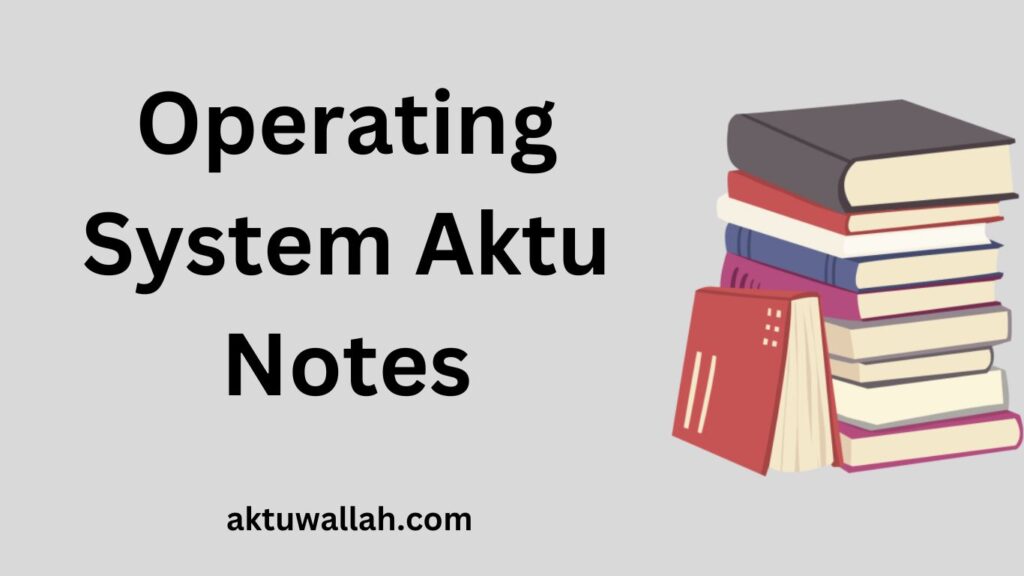Download Operating System AKTU Notes Pdf For AKTU B-tech 2nd Year:
Operating systems play a crucial role in the world of computer science and engineering. They serve as the backbone of any computing device, enabling efficient management of hardware resources and providing a user-friendly interface. For students pursuing B-Tech in the second year at Aktu, gaining a solid understanding of operating systems is essential. In this article, we will delve into the significance of operating system Aktu notes and explore some key topics that students should focus on. So, let’s dive right in!
How to download Operating System Aktu Notes Pdf for free?
Simply click on the given link.
GET PDF
Other 2nd year handwritten notes pdf: Click Here
2nd year Quantum pdf: Click Here
2nd year all subject pyq: Click Here
2nd year all branch latest syllabus: Click Here
Table of Contents
- Introduction to Operating System Aktu Notes Pdf
- Types of Operating Systems
- Process Management
- Memory Management
- File Systems
- Input/Output Management
- Device Drivers
- Synchronization and Concurrency
- Deadlocks
- Virtualization
- Security and Protection
- Distributed Systems
- Case Studies
- Popular Operating Systems
- Conclusion
Introduction to Operating System Aktu Notes Pdf
In this section, we will provide a brief introduction to operating systems. We will explore their definition, functions, and the importance of studying operating systems for B-Tech students.
Types of Operating Systems
Here, we will discuss the different types of operating systems that exist. We will cover single-tasking and multitasking systems, as well as various examples and use cases.
Process Management
Process management is a critical aspect of operating systems. In this section, we will explain what a process is, how it is managed by the operating system, and the concepts of process scheduling and interprocess communication.
Memory Management
Efficient memory management is vital for optimizing system performance. We will discuss the concepts of virtual memory, memory allocation, fragmentation, and the role of the operating system in managing memory resources.
File Systems
File systems facilitate the organization and storage of data on storage devices. We will explore different file system types, such as FAT, NTFS, and ext4, and discuss file system operations, permissions, and directory structures.
Input/Output Management
Input/output (I/O) management handles the interaction between the computer and its external devices. Here, we will cover I/O devices, I/O buffering, interrupt handling, and the role of device drivers in managing I/O operations.
Device Drivers
Device drivers are crucial software components that enable communication between the operating system and hardware devices. We will discuss the importance of device drivers, their role in system operation, and common types of drivers.
Synchronization and Concurrency
In multi-tasking systems, synchronization and concurrency control mechanisms are essential. We will explain the concepts of mutual exclusion, deadlock prevention, and synchronization techniques like semaphores and monitors.
Deadlocks
Deadlocks can disrupt the smooth functioning of an operating system. Here, we will define deadlocks, discuss necessary conditions for deadlocks to occur, and explore deadlock prevention, avoidance, and recovery strategies.
Virtualization
Virtualization allows multiple operating systems to run simultaneously on a single physical machine. We will delve into the benefits of virtualization, different types of virtualization, and virtualization platforms like VMware and VirtualBox.
Security and Protection
Operating systems play a crucial role in ensuring system security and protection against unauthorized access. In this section, we will discuss user authentication, access control mechanisms, encryption, and common security threats.
Distributed Systems
Distributed systems involve the coordination and sharing of resources across multiple computers. We will explore the challenges of distributed systems, communication models, and distributed file systems like NFS and DFS.
Case Studies
Real-world case studies provide practical insights into operating systems. We will examine notable case studies like the design of UNIX, the Windows NT kernel, and the architecture of Linux, showcasing the practical applications of operating systems concepts.
Popular Operating Systems
In this section, we will highlight some of the most popular operating systems used today. We will provide an overview of Windows, macOS, Linux distributions, and mobile operating systems like Android and iOS.
Conclusion
Operating systems are the foundation of modern computing, and understanding their principles is crucial for B-Tech students. In this article, we explored the significance of operating system Aktu notes and covered key topics such as process management, memory management, file systems, and security. By studying these topics, students can gain a comprehensive understanding of operating systems and their practical applications.
2 thoughts on “Download Operating System Aktu Notes PDF”